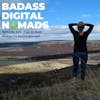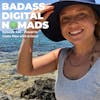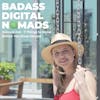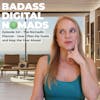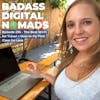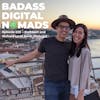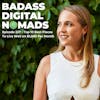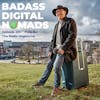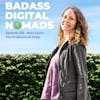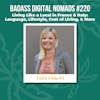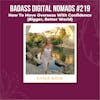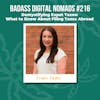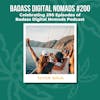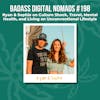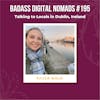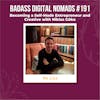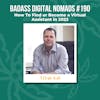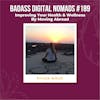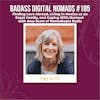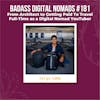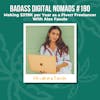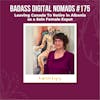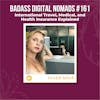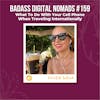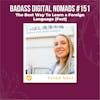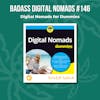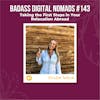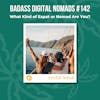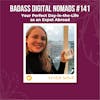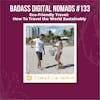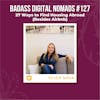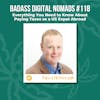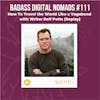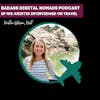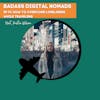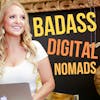2022 Year in Review
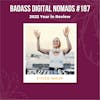
Kristin shares her biggest insights, lessons, and takeaways from 2022 and looks forward to 2023.
Kristin shares her biggest insights, lessons, and takeaways from 2022 and looks forward to 2023.
What would you like to hear Kristin cover more of in the upcoming year? Where would you like to travel on a Traveling with Kristin trip or retreat? Reply in this short poll and enter to win a free consulting call with Kristin.
Episode 187 Special Offers:
- Apply for Kristin’s Ready to Relocate program
- Become a Patreon Patron
- Buy Digital Nomads for Dummies
- Enroll in SafetyWing Travel Insurance
- Fill out the podcast poll
- Gain freedom as an online freelancer
- Join Kristin's mailing list
EPISODE 187 TOPICS DISCUSSSED:
- Holiday travel delays
- Badass Digital Nomads listener stats, countries, and demographics
- 5 Life Lessons from 2022:
- 1. There's more to creativity than you think
- 2. The relationship between time, failure, growth, and success
- 3. Opportunities in the Permissionless Economy
- 4. Inputs = Outputs
- 5. Your tribe/community is everything
- Goals for 2023
- Philanthropy
- Sustainable Travel
- Traveling with Kristin Trips and Retreats
RESOURCES & SHOW NOTES:
Related Podcasts:
- Top 5 most downloaded podcasts from this year:
- 100th Anniversary Episode
- Lessons from 1 Year in Podcasting
- Ayo Awosika on How To Make Money Writing on Medium
- Sustainable Travel
Videos Mentioned:
- YouTube Community Page Polls
- 10 Passive Income Side Hustles
- Our Universe on Netflix
- Elon Musk in 1998 (CBS Sunday Morning)
- Istanbul Turkey Travel Vlog
- The Last Tourist Documentary
Recommended Books:
Articles:
Philanthropic Organizations:
- Team Trees: 24 million trees planted
- Team Seas: 33 million pounds of trash removed
- Charity Water
- One Tree Planted
...........................................................................................
Support the Badass Digital Nomads Podcast:
A special thank you to new "Producer" Patron, Eric Kwang, contributing $100 per month to support Kristin's content.
Become a Patron for $5/month at Patreon.com/travelingwithkristin
...........................................................................................
Connect with Kristin:
- Follow on Instagram
- Subscribe to Traveling with Kristin on YouTube
- Join the Badass Digital Nomads Facebook Group
- Subscribe to Kristin's weekly travel newsletter
...........................................................................................
Podcast descriptions may contain affiliate links of products and services we use and recommend at no additional cost to you.
Kristin: 00:00:00 That theme is that just because something doesn't happen for you this year doesn't mean that it will never happen.
Introduction: Welcome to Badass Digital Nomads, where we're pushing the boundaries of remote work and travel, all while staying grounded with a little bit of old school philosophy, self-development, and business advice from our guests.
.
Kristin Wilson, Host: 00:00:28 Hey there, Kristin, from Traveling with Kristin here and welcome to episode 187 of Badass Digital Nomads. Happy New Year, Merry Christmas, happy holidays, all of that great stuff. Today's episode is a bit delayed due to some adventures in holiday travel over the past week, but better late than never am I right. And in today's episode, I wanted to do a bit of a solo episode year in review, some lessons learned, some reflections. We like to do this type of episode around the end of the year, beginning of the year or on our anniversary episodes, like the 100th anniversary. So if you wanna, um, go back and listen to some of those similar episodes with different perspectives from different years, then I will link to those episodes in the show notes, including one that we did I think for the 100th anniversary episode, which was an interview with me by one of the podcast listeners.
Kristin: 00:01:41 So that was pretty cool. But I hope that wherever you are in the world, you're having a beautiful holiday season and a very peaceful and relaxing end to the year, which I know can sometimes be a challenge with all of the hustle and bustle and activity that this season brings. So hopefully you're staying sane, hopefully you're eating some good food, you're around some family, some friends, and you're getting some good relaxation time in, I'm taking mine a little bit late because of this. Yeah, this adventure that I had trying to get back from Portugal for Christmas because my sister and her boyfriend were coming back to Florida for Christmas, so wanted to be here with my family. We have this New Year's Eve tradition where we go out to a Japanese restaurant. I don't know how that started exactly, but <laugh>, it's been going for at least 10 years.
Kristin: 00:02:40 And then on Christmas day we cook dinner or I cook dinner cuz I'm the only one that cooks in the family. And some years it's more elaborate than others. Sometimes I even cook or bake an apple strudel, which is a Hungarian recipe from my great-grandmother. So that's always really fun and makes a huge mess in the dining room because I have to use a really big table to roll out the pastry dough. But I didn't have time to make that this year. But I did have an apple strudel in Amsterdam, so I guess that counts <laugh>. So yeah, if you were following my adventures on Instagram, I posted some of them in the stories, but I left Porto, Portugal on Thursday morning and I didn't get back to Florida until Monday morning. So it was about five days of travel where I, my flight was delayed out of port due to rain.
Kristin: 00:03:44 Then I had an overnight layover in Amsterdam and then a flight to Minneapolis, Minnesota, which I almost changed because of the weather and potential for delay. But I checked the weather and, and they had just had a snowstorm and then everything was fine, it was clear and sunny. And so I took a risk of connecting in Minneapolis instead of Atlanta or somewhere closer to Florida and it looked like it was going to work out. But then our pilot got sick, so the delays we had in Minneapolis weren't even weather related, even though the rest of the United States was having thousands of cancellations. I think I saw a stat it was either 3000 cancellations or 7,000 and almost as many delayed flights. So the whole US continental US and probably Canada were going through a lot of, um, cancellations and delays. But in our, in our specific scenario, it was just that the pilot got sick.
Kristin: 00:04:49 And so we were waiting for a new pilot and then by the time the new pilot arrived and we boarded the plane again, someone from the crew was over there f a a hours. And so we had to deplane and then wait for another crew, <laugh>. And then by the time that crew arrived, like three hours later, the pilot was over his f AA hours. And so this, by this time it was like midnight. So then we waited for a third pilot and then around one in the morning, they just decided to cancel the flight. And so I ended up staying that night in Minneapolis. I think I got to the hotel around two in the morning and then ended up staying another night because my flight the next day was canceled. I think I had two more flights canceled, and then the next earliest flight that I could get out was Tuesday night, which would be tonight.
Kristin: 00:05:44 And I just really didn't wanna stay in a hotel in Minnesota for that long with barely any clothes because I had been without my luggage since Thursday. And so I had to go shopping <laugh> luckily, uh, Marshalls was open in Minneapolis and I was able to go get some sweaters and scarves and clothing to brave the negative seven degree weather with negative 24 degree windchill, which was, uh, a an amount of cold that I have never felt before where even walking outside for four or five minutes was concerning <laugh>. I was like, is this, is this damaging? So for all of you who live in places that have regularly that low of temperatures, I salute you and I don't know how you do it. Um, so yeah, so that was really cold, but I had been wearing the same clothes for two days, so all I wanted was like clean clothes, a shower, a bed, and I got all of those things.
Kristin: 00:06:43 So I was pretty happy. And then until my next flight got canceled and then I ended up buying a really, really expensive flight on a separate reservation to get home by what was supposed to be Christmas day night. But that flight was delayed, so I missed my connecting flight and then didn't get home until after midnight. But I did make it home in the end. So it was a journey and a lot of things went, went wrong. But the highlights of the journey were actually hanging out in the freezing cold airport in Minneapolis and getting to meet other people from my flight. Like first I met this guy in the Sky Club and he was a government contractor, hilarious, like this guy could have been a standup comedian. Then I met a pro fisherman from Minnesota and was like looking at all of his fishing photos and camping photos.
Kristin: 00:07:40 And then I met a really nice family also from Minnesota, a husband and wife and a son who were traveling to go see their daughter in Florida. And the couple, they wanted to kind of start a side hustle or get into something new and I gave them the copy of my book that I had been carrying around for the past couple months. And so the mom was really, really excited about that. And she started reading the book at the airport at 11 o'clock at night, midnight. So we were just all kind of sitting there laughing, like delirious, cold, hungry, tired, the whole shebang. But all I could keep thinking about was that even though there were all of these travel annoyances, I was still so lucky to be in that situation at all because there were so many people that were stranded in airports without a hotel.
Kristin: 00:08:32 I think there were hundreds of people sleeping on the ground in the Minneapolis airport. I mean, it, it kind of looked like a tent city on the floor of the airport. Then there were people that were under rolling blackouts throughout the US with freezing temperatures and no electricity. And then of course there's the people in Ukraine who are suffering under relentless Russian attacks and also freezing temperatures and no electricity. And then, you know, there's people all over the world that are undergoing so many more hardships than me being late to get home. So travel delays can be annoying, but at the same time I just kept reflecting on how grateful I was that I even it could be traveling home and that I had, you know, food and water and shelter and the ability to purchase warm clothing even though for dinner I just ate a Turkey sandwich from the hotel <laugh> and actually the hotel was so overwhelmed with guests and then they couldn't find my reservation, like somehow it got deleted from the system.
Kristin: 00:09:39 So the people just let me stay for free for two nights and they didn't even bother charging me. And they even gave me free snacks from the snack bar because the restaurant in the hotel was closed and like everything was closed. And at that point I didn't even feel like ordering pizza from Uber Eats or something. I just wanted to go to bed. But long story, long <laugh>, I am now here in Florida and so I celebrated Christmas with my family on the 26th instead of the 25th. So yesterday I kind of had my Christmas day like cooking all day and walking around in slippers and watching the holiday on TV and just kind of kicking back with the fam. So that was really good and that's why the podcast is delayed. But we're here. So without further ado, yeah, just a reflection on, uh, this year.
Kristin: 00:10:33 So this has been the third year of Badass Digital Nomads. And so I wanted to share a few of the statistics which has become a little bit of a tradition on the show and also because you can't see or communicate through the podcast with other listeners. And so I like to kind of share some insights about who everyone is so that you know, strength in numbers and you can kind of find common ground with people even if they're listening from the other side of the world. Because everyone who ends up listening to this podcast, it's for a reason. And I truly believe that you are here for a reason. You stumbled across the podcast for a reason and um, I've run into podcast listeners in the most unexpected places and that's just been so fun. I think I mentioned a couple years ago, it was New Year's week of 2020 and I was at a silent retreat in Canada or a silent meditation course and my roommate was a listener of the podcast and I didn't know that until the day that we left because we couldn't talk to each other because it was a silent course <laugh>.
Kristin: 00:11:50 So that was funny to learn on the last day when we all were meeting each other kind of for the first time and talking and, and getting to know each other that um, I found that out. And then this year, well a couple weeks ago I was in Madeira Island at a conference called the Nomad Island Fest. I was walking down to do a morning workout on the beach and the girl who I was walking next to, we started talking and somehow figured out that she listened to Badass Digital Nomads. And I was like, wait, I'm the host of Badass Digital Nomads. And she's like, no way. I love that show. Like I love the questions that you ask people and I can't remember where she was from now, but just like little things like that and knowing how strong and how connected, uh, our community is around the world, to be able to run into people serendipitously is just really cool.
Kristin: 00:12:48 So shout out to her and shout out to you and shout out to everyone who's been listening. So to date, we've had 325,000 unique downloads and the top five podcasts that you guys have downloaded this year. Like the most popular podcasts in fifth place, we have Dating as a Digital Nomad, The Good, the Bad, and the Ugly. Maybe I should do another one of those for this Valentine's Day <laugh>. In fourth place, we have Living in Spain as An Expat or a Digital Nomad in third place Medical Tourism and the Cost of Healthcare Abroad in second place was a recent episode that I published, which was My First Month Living in Portugal as a Digital Nomad, which I also did a video about. And the number one podcast of the year is Taking the First Steps in Your Relocation Abroad, which was really cool to see because that episode I published in January of 2021 and that was the first group call of my group relocation coaching program ready to relocate.
Kristin: 00:14:10 And I really wanted to publish that call because I thought that it showed just so much that many of you have in common when it comes to your goals, your ambitions, your fears, and your concerns about moving to another country for the first time. And so it was really cool to see that that was the episode that you guys liked the most as well and that you downloaded the most. And so if you're listening to this episode this week, it's also the last week to sign up for the January group of Ready to Relocate, which is starting on January 7th. So if you want my personal help with your relocation this year, like if you're planning to relocate in the next year or so and that episode resonated with you and you want to move, but you're just a bit stuck in information overload and overwhelm, or maybe you just want like a community of like-minded people that are also planning a move this year and you know you want my guidance on your move, then you can apply for this year's group at travelingwithKristin.com/apply.
Kristin: 00:15:34 And spaces are limited, but we still have a few spaces left. And again, you will need to apply, talk to me or someone from my team and get approved all before January 7th if you wanna join this group. And I'll probably run another group later this year, but if you wanna get in for January, now is the time at travelingwithkristin.com/apply. It's also really cool to look at all the different countries that you guys are downloading the podcast from. We are up to 187 different countries. Some of the newer countries with the least amount of downloads that I don't know if they've been on the list before are Chad, Kosovo, Oman, Keisel, St. Vincent, and the Grenadines, Solomon Islands, the Cook Islands, Swaziland, and New Caledonia. One that I remember from before was I think the Aland Islands, which was in Northern Europe. So all different corners of the world that uh, you guys are listening and downloading from.
Kristin: 00:16:46 And then the top 10 countries, so maybe this is you include number 1, the US of A. number 2, Canada, number 3, UK, 4 Germany, 5 Australia, 6 Spain, 7 France, 8 Portugal, 9 Japan, 10 Mexico, 11 Netherlands, and 12 Brazil. So top 12 there. I also want to thank everybody who left a review for the podcast this year. We have 118 ratings and reviews on Apple podcasts, but I think we can increase that in 2023, especially with 300,000 people listening in. So every review counts. Uh, we also have Patreon, patreon.com/travelingwithkristin. So I wanted to thank all of my patrons this year, including my new producer patron, Eric who has been a longtime supporter of my YouTube channel Traveling with Kristin and he's also my number 1 Twitch supporter for my DJ sets on Twitch. So thank you so much Eric for just being an all around, um, rockstar subscriber and supporter, but also thank you to all of my patrons, many of whom have been around for three or four years now, uh, supporting the channel and supporting the podcast.
Kristin: 00:18:18 Really appreciate that. And also thank you to everyone who bought me a coffee this year at buymeacoffee.com. So on badassdigitalnomads.com we have a donation page where there's like PayPal, Buy Me a Coffee, Patreon and all different ways to support the show and also leave a review. You can leave a review on Spotify, on Apple Podcasts. We just had a new one on Cast Box. I believe many podcast platforms will let you leave a review or you can also just leave one on the website at badassdigitalnomads.com/review. We got a new review this month in December from GA Girl on Apple Podcast who says, "I've been listening to this podcast for a long time. I lived overseas for 22 years, but not as a nomad. This is so fascinating and love the information in every podcast. This is in my top 10 favorite podcasts."
Kristin: 00:19:18 Such great information and would like to know more of the practicalities of getting started in this lifestyle. So thank you Ga Girl for your review. Really cool to hear that you lived overseas for 22 years but are still finding value in this podcast even as a veteran expat and world traveler. So that is amazing. We will have lots more episodes with info on getting started in this lifestyle. There's also, of course my book Digital Nomads for Dummies, which came out in August of this year. And for relocation help we have Ready to Relocate. And then also for more help with online business and making money online. I plan to have some extra resources for you guys this year, but currently the only course or program that I have for getting started and transitioning from a nine to five job into working for yourself as a freelancer is my Freelance to Freedom program.
Kristin: 00:20:26 I will leave a link to that and the show notes. So that's for people who want to start freelancing for the first time, but you're not sure exactly what you can do to make money online that would help you with that. But I also plan on doing some more videos about the remote work side of a location independent lifestyle. So on the podcast we do a little bit of both travel and remote work and work from home and and productivity tips and things like that. But I just published a video on 10 Passive Income Side Hustle Ideas last week on YouTube and it went viral. It has like 200,000 views in the first week. And so I did a poll on my YouTube community page asking if people wanted more online business content, more travel content or more of both and 51% voted more of both and there were about 500 votes in that poll.
Kristin: 00:21:27 So if you wanna go vote in the poll, that is at youtube.com/travelingwithkristin and then click on the community tab and make your voice heard. I will also leave a link to the podcast poll. So this is a Google form that I put out last year, which is called What Can I Help You With? And I really rely on your responses to this poll to help guide the content for the next year of the podcast. So we did it last year, we're gonna do it again this year. I will link to that, uh, poll in the show notes and I also pick a handful of people who get free one-on-one phone calls with me just as a way to say thank you for taking the time to fill out that poll. I think I did about 50 phone calls last time, so I don't know if I'll be able to do that many calls again this year, but I'll definitely pick a few people to get a free call with me to talk about whatever you want.
Kristin: 00:22:28 And so in this form it's asking what you want help with, what do you like about the podcast, what do you not like as much about the podcast? And also asks about things that you're interested in, things that you want help with in the upcoming year. And that helps me narrow down what guests to bring on the show, which topics to cover and just make it better and better each year and more valuable and more interesting and just a better listening experience. I also wanted to share five lessons or themes that really stuck out to me in the past year. I don't know if I wanna call them life lessons, but they're more like learnings, like significant learnings or epiphanies or realizations that I had that I just wanna share with you and, and maybe you can apply it in your life or maybe it already resonates with you with other things that you've been thinking about or struggling with during this year.
Kristin: 00:23:30 And also share with you a bit of some ideas of things to do for next year, uh, areas that I want to focus on. And then we will wrap it up for this episode. And next week we get back to some more travel content with the top 10 places to visit in 2023 and then into some more interviews to kick off the new year. So these are in no particular order, but the first one I have written down is about creativity. And this one really was a wake up call for me. This one completely, completely transformed the way that I view work and everything creation in general. So my entire life I always thought that there were some people who are more creative than others or there are some people who are creative and there's some people who aren't. I also thought that creativity was something that you had to learn to do and something that you had to practice to be good at or that you're just born with it or you're not.
Kristin: 00:24:37 So it's either something that you have to improve like a skill over time or you just have it or you don't. And I don't know where I picked up that belief. It was probably from school where like some kids are good at art and some aren't or I don't know. But at some point this year, and I can't remember exactly where I heard it or read it, but I realized that you don't have to be good at creativity, you just have to do the work. Like you just have to sit down and give yourself the space and the time to work on a project. And by sitting down to do work, you connect in that flow state with creativity. So humans are all channels for creativity and you don't have to try to be creative. All you have to do is sit there and try to do the thing that you wanna do.
Kristin: 00:25:39 So whether that's, in my case this year it was writing a book, which is something that I spent the whole first eight months of the year doing. Um, but it could be on coding a really complex project. It could be creating a marketing plan for your business. It could be solving a difficult equation or a problem at work. Whatever the thing is that you need to do, the burden for you to be creative is is not on you. I don't know if I'm explaining this right, but it's just a matter of doing the work and letting time help you come to the answer or help you complete the project. So you know how when you get stuck on something and if you go for a walk or if you take a break or if you sleep on it, or even if you take a few days away and then you come back to that problem, you always have a fresh perspective and you always have a new idea or a new solution.
Kristin: 00:26:42 It's kind kind of like that. And I think this is what Stephen Pressfield is trying to convey with his new book that I haven't read yet, but I just downloaded it on Audible. It's called Put Your Ass Where Your Heart Wants to Be. Yeah. So Stephen Pressfield is the author of The War of Art, which is a really good book for doing creative work or doing any kind of work or overcoming procrastination. And from what I understand, because I heard an interview with him about this book, is that it's the same premise. Put your ass where your heart wants to be to do the thing that your heart wants to do and your soul wants to do. All you have to do is put in the work. And of course, doing the work is the hard part, but the simple thing about it is that you can just dedicate 30 minutes a day or one hour a day to whatever the thing is that you want to do and not be worried about if you have the skill to do it or if you have the creativity to do it.
Kristin: 00:27:53 All you have to do is give yourself that time consistently, whether it's five days a week or seven days a week, whatever it is. And when you sit down to do the work, inevitably you get into that flow state unless you're like checking your phone every three seconds and watching TikTok. But if you, you know, shut everything off, go in airplane mode, give yourself that block of time to do the work. You don't have to worry about being really smart or being super creative because through the act of doing the work, these universal forces of creativity or whatever it is that's happening out there kind of conspire to come together to help you get shit done. And this is a game changer because when you realize that you don't have to be the one who comes up with the great discovery or the aha moment, you just have to be the one who chips away at the thing or the problem for a long enough period of time that you figure it out or that you finish it.
Kristin: 00:29:04 That is a much different proposal than thinking that you are just a human who has to get really good at creativity before you can do something important. And I think a lot of us fall into this trap of like, I have to learn this skill or I have to do this thing before I can do that thing. But this realization for me clarified that it, it really doesn't matter what where your skill level is at right now, it's just a matter of time, time's effort. And my friend Ayo Awosika, who I have two podcast interviews with, so we'll link to those in the show notes, he is one of the top writers on Medium. He was the top earning writer on Medium. I don't know if he still is, but he was for a really long time and he actually was divorced, like single dad working at a Best Buy or something like that.
Kristin: 00:30:07 And he wanted to be a writer. So he started waking up at four or five in the morning and making himself right for one hour. And he made a rule where he was not allowed to do anything else other than write <laugh>. So if he had to sit in his chair and stare at the wall for an hour, that's what he would do. So it's either write or do nothing, like you can't read, you can't look at your phone, you can't do anything else. And that kind of speaks to this philosophy. He wasn't a writer, he didn't have any experience writing, he didn't have any training of writing, he didn't major in English, he just sat down to write. And through sitting down for one hour a day for so many years, eventually he started writing <laugh> and eventually he started publishing that writing on Medium and eventually he became the top earning writer on Medium.
Kristin: 00:31:06 And so was he. Is he more creative now than he was before? Is he more skilled now than he was before? He's probably built a solid skill set, but he wouldn't have built that skillset of writing or that portfolio of writing if he didn't just sit down and do the work. And so I've been thinking about this a lot when it comes to music production. I started learning how to use software like a DA, a digital audio workstation to produce music. But I don't remember how to play piano from when I was 10 years old. I don't remember any music theory and I could say, okay, I need to learn about music for the next five years before I can make a song. But this philosophy of just doing the work and not worrying about creativity would say, you don't need to spend <laugh> three to five years learning a bunch of stuff about music.
Kristin: 00:32:14 You just have to sit down for an hour a day and work on finishing one song. And you don't actually have to know music theory to make a song and you just have to work at it until you finish the song. And so if there's something that you have been procrastinating because you think you need more skills or that you're not creative enough to do something, I would say a big theme from my life this year and a big change that I never realized before is that you don't have to be good at being creative, you just have to put your butt in the seat and do the work. And that creativity will come naturally through the intention and the time that you dedicate to that thing. So do the thing. Another thing that I've been mulling over a lot this year is the relationship that we have with time.
Kristin: 00:33:14 So this probably started during the pandemic when I started realizing more about the just day-to-day nature of time and then how time kind of lost all meaning under lockdown and many people started reevaluating how they spent their time, whether you were commuting to work or whether you were even working at a job versus working for yourself. Many people I think, reevaluated how they were using their time, how they wanted to use their time moving forward and what was most important. And this year I've been thinking about time in relation to success versus failure and time that it takes to birth something, whether it's a human being or a project that is coming to completion. And I've started to question if failure even exists because, and I, I know we've probably all heard this before, like that the only failure is giving up, but I really, it it's really started to sink in that there is no failure with time.
Kristin: 00:34:41 Like if you just keep going and let things continue to unfold over time, time is a gift between point A and point B that lets things develop and unfold. That's why the journey is the destination, right? And that's why when you get to the goal, when you get from point A to point B, there's another goal or there's another mountain to climb or there's another place to go. And that's just the nature of human evolution. But lately I've been watching the, uh, The Universe documentary on Netflix. I think I'm only three episodes into it so far. But that was just, um, coincidence that I watched that at the same time I was already thinking about this concept and that documentary was quite eye-opening because it, it kind of reminds you of things that maybe we learned in seventh grade science class, but you don't remember.
Kristin: 00:35:44 But it goes back to how the universe started and talks about such large chunks of time that it's, it's almost impossible for our human brains to even process the amount of time that it took for the solar system to develop, for earth to develop and just how things keep going. Like it explores the patterns in nature and the seasons on the planet. So like one of the episodes follows a bear going into hibernation and then having bear cubs and then coming out and searching for food. And you get to see the length of time that it takes for the bears to actually make it to the river where they can eat the salmon that comes around once per year and then it all starts all over again and they go back and you know, now it's getting into winter, they go back to the cave and there's these dynamics at play throughout the world, throughout nature.
Kristin: 00:36:46 That's one thing. And for us as well as humans, like seasonality affects us. The amount of light exposure we get, the length of the days, the length of the nights, the temperature, like there's all these different elements that affect our activity levels, our energy levels, our mood. And so I've been thinking about time from a seasonal perspective, but then I've also been thinking about time within the course of a lifetime and how much you can actually accomplish in your life and experience in your life before we run out of time. And I used to think that if you didn't do things within a certain time period within a certain deadline, then that was failure. But, and now I've been thinking about it more as just finding different ways that things work and don't work. Like many of us have heard the example of Edison and the light bulb testing a 10,000 different ways before he got one to work.
Kristin: 00:37:55 I just saw a video recently on YouTube from CBS Sunday morning where they had an interview with Elon Musk from the nineties during the lawsuits with Microsoft and Bill Gates and Elon was talking about how he was completely broke after college living in his office, that he was renting for $200 a month drilling into the floor of the office to steal internet from the company below him to found his first company. And now, you know, he's a billionaire who's doing rocket science to bring people to Mars and whatever's going on with Twitter. But you know, so much has happened between college graduate Elon or college dropout, maybe, I don't remember if he graduated college aged Elon sleeping on the floor of an office to a multi-billionaire Elon who is, you know, acquiring companies and building spaceships and Tesla and all of the things that he's doing.
Kristin: 00:39:07 And what is the one thing in between? It's just time. Like he couldn't have gone from sleeping on the floor of the office to building Tesla in the matter of one year, but over the course of a couple decades, that's where he's gotten to so far and he is nowhere near stopping. And so if he would've just given up and taken a regular job because it paid a better salary and then he could live in a house instead of an office, uh, you know, maybe things would be different, things would be different and we wouldn't have many of the inventions that he is responsible for bringing into the world today. So the second theme is a new found respect for the amount of time required for things to unfold and the knowingness that there is no such thing as failure if you just keep going and if you keep trying and if you keep chipping away at something, if you decide to abandon a project and do something else, you could consider that a failure.
Kristin: 00:40:16 But also if you decided to keep going, you probably would succeed at the ultimate goal eventually. But we just don't know how long things will take. And we live in a society and a time of history where everything is very fast paced and we have like, we want this instant gratification for everything <laugh>, whether it's, you know, having a flight that isn't delayed or getting your Starbucks order when you walk in the door so you don't have to wait in line. Like there, there's so many things that we want fast. And after the pandemic, I've just been thinking more about the role that time plays in allowing us to enjoy life and to feel fulfilled in life because if you just went from being born to being 50 years old overnight, it just wouldn't work. <laugh>, we need that time in between to develop as people and uh, make connections with other people and grow physically, mentally, emotionally.
Kristin: 00:41:20 Like that is the gift that time gives us. And without time we wouldn't have anything. We wouldn't have this planet, we wouldn't have seasons, we wouldn't have animals, you know, we wouldn't have life. And this is something that's especially poignant to ponder around the new year because many of us are reflecting on what we did and didn't do during the year, what we want to do for next year. And I think there's a quote that's like people overestimate what they can do in a day and underestimate what they can do in a year or in 10 years. And so that is the thought that I wanna leave you with on that theme is that just because something doesn't happen for you this year doesn't mean that it will never happen. The third thing is the permissionless economy.
Safety Wing
Have you ever felt confused or overwhelmed with all the different travel insurance options out there?
Kristin: 00:42:23 If so, look no further Safety Wing's Nomad Insurance is a flexible travel medical insurance plan that covers you. If you need medical assistance while outside your home country, you can get a short-term policy for just a few days or a week or pay month to month, just like a subscription already traveling, no problem. You can sign up for coverage from home or abroad. It's fast, easy and affordable. Sign up for coverage today at safetywing.com or by using the link in the show notes. The third thing is the permissionless economy. The idea here is that the permissionless economy is the present and the future of the economic engine of the world. It means that all of us as individuals have access to the internet and technological tools that allow us to invent our own jobs, create income in unprecedented ways and in sometimes very weird ways or very non-traditional ways.
Kristin: 00:43:28 And that's going to continue. And so this is a theme that I see gaining a lot of speed and power in the upcoming years. It's something that I wrote about a bit in 2019 when I wrote this article about ways the world would change when everyone worked remotely. And I didn't necessarily have the term yet for what the permissionless economy was, but the way I described it is that individuals would begin competing with corporations and potentially former employers. So if you are somebody who worked at Walmart with the tools of the digital economy, you could become an Amazon f b a entrepreneur who was suddenly modeling the business model of Walmart as a sole proprietor instead of working as a salaried employee. <laugh>, what if you did the same thing where you sourced products from China, sold them through Amazon or other websites, and essentially mimicked that same business model.
Kristin: 00:44:41 As an entrepreneur, there's nothing stopping you from growing that business as big as you want from adding more brands, adding different types of stores. And that is something that had so many barriers before the practicalities of building a similar sort of retail business to a big box store would be so much more complicated and would take so much more capital upfront compared to today where really all you need are skills and not necessarily an upfront investment. You just need to learn how to do something and then do it. And that is the essence of the permissionless economy. It's also what we saw with the Great resignation in 2020 to 2022, where um, people were choosing not only to quit working for their employers, but to quit working for an employer altogether and just start working for themselves. And all of a sudden people's side hustles became their main source of income.
Kristin: 00:45:43 And I find this idea of the permissionless economy to be so inspiring, you can create income in an unlimited number of ways, whereas before with the industrial model, so many people were making money directly from an employer, whether that was a factory or a business, and then kind of stuck working there their entire career. Now we have so much flexibility and can work for anyone or no one at all. You can see this example just looking at all of the different types of services available on freelancing websites, individual people creating their own packages of services that they sell that are completely customized to their skillsets and to what they want to sell. And I think that's so cool because no one is is calling you up saying like, Hey, you can sell this service and that service online. No, you just decide what it is that you want to sell if there is a need in the market.
Kristin: 00:46:42 And then boom, you've created a new business model. You'll also see this a lot with the creator economy. So looking at the top of the creator economy, content creators are operating at the same level of a media company like CNN or Fox News or N B NBC or even Netflix or we have content creators creating documentaries on Netflix. This also is so cool because I think in the 2016 elections in the US I remember there was a YouTube news site, it was the Young Turks actually they were bidding to host one of the presidential debates or to moderate one of the debates. And I remember thinking that that was such an amazing time in history to to see, to witness that moment even though they didn't win the bid. The fact that people who started covering topics that they wanted to cover on YouTube were trying to moderate a presidential debate.
Kristin: 00:47:53 And they will, I'm sure they will. I'm sure many YouTube news channels will end up being the moderators of presidential debates in the future. But that's not something that other news organizations said, Hey, guess what? If you are passionate about politics, you can start a YouTube channel and when you get big enough you can moderate a presidential debate. No, that was just something that they decided to do and they eventually got big enough and had enough influence where they were a viable contender to moderate a presidential debate. Not some news organization who maybe had enough funding or sponsors or bequeathed this opportunity to moderate to one of their journalists or news anchors, but it was like just regular people who decided to start a YouTube channel and wanted to do that. Mr. Beast is also an incredible opportunity of this dynamic operating at the highest level because I just saw a video about him and his launch of Beast Burger where he broke the world record for the number of hamburgers sold in a day.
Kristin: 00:49:05 I think he tripled or quadrupled the world record and he's a content creator with his own physical product line and chain of restaurants. So his physical products are available in Walmart. He has a chocolate bar line that is competing with global brands like Hershey's, and now he has Mr. Beast Burgers that's competing with McDonald's, with Burger King, with these fast food like behemoth companies in the United States and probably in the world eventually. And again, it's not like anyone said, Hey, if you're a YouTuber, you can compete with McDonald's. No, he came up with the idea, he did a better job than established companies and then he opened physical stores that had thousands of people waiting in line to buy the hamburgers. I mean, that's like the epitome of the permissionless economy. And he's set on podcasts that he has plans to one day run for president when he's around 40 years old.
Kristin: 00:50:13 And I'm a hundred percent sure that he'll do it and that he'll win because he can. And he doesn't have to have a bunch of campaign donations because he can self-fund his campaign and no one can tell him that he can't run for president, you know, and if he has a hundred, I think he has like 115 million subscribers on YouTube. Imagine how many he'll have by the time he decides to run for president. And so it's kind of like how Trump ran for president and he won, like no one in the political establishment was telling him that he could run for president or that he could win. It's pretty crazy that he did win <laugh>, um, being a businessman and a reality TV star. But now we're seeing this happen with, um, with young creators that are generating billions of views, hundreds of millions of subscribers who can just decide that they want to be the president of a country and then go and do it.
Kristin: 00:51:10 And so regardless of where you fit into the permissionless economy, I just want to leave you with this is the time that we're living in now, and no one can tell you what you can do or not do as long as it's legal and uh, what you can create in different ways of creating a lifestyle for yourself. So my job is a great example of the permissionless economy because I don't have a certification in being a relocation consultant, but that is the job that I gave myself since 2011 and I didn't go to film school or major in communications yet. I create videos for YouTube and I have this podcast. So it means that you seek out the skills and knowledge that you need to do the job that you want to do, rather than taking the traditional route of acquiring those skills through higher education or through an employer.
Kristin: 00:52:13 The fourth theme I've been thinking about is how what you pay attention to becomes a part of who you are. We're living in a time where algorithms by and large decide what we see, especially on social media platforms. And so we can live in an echo chamber that is not chosen by us or not within our control, by spending a lot of time on platforms that are algorithm driven and that are showing us what we want to see. But we can also inform those algorithms by what we choose to watch, what we choose to consume, and we can change our lives with what we decide to do with our time and what we consume offline. This dynamic has been happening for quite a few years now, especially with the rise of social media. But the more choices that we have and especially living in the permissionless economy, the more autonomy we have over what we want our life to be like, look like, feel like.
Kristin: 00:53:31 And this starts with little things like what your daily habits are, but then it also rolls over into more long-term pictures, like what you decide to do with your career, where you decide to live, what causes you invest your energy into and how you want to feel. I think during the pandemic years with the lockdowns in my personal life, there became this very stark choice, like, do I want to bow into the fear and panic that's going on? Or do I want this to be a time of rest of healing, of caring for my health and wellness? Like there were a few different paths that people could take. I was like, okay, I can just binge watch the news, eat cookies on the couch for only so many days, <laugh> before I'm gonna decide like, is this what I'm gonna do for the next year? Or do I wanna just turn off the news and open a book and do something different?
Kristin: 00:54:37 As we came out of the pandemic and especially this year, I started to realize that there were almost more defined camps or subcultures of people that were extra passionate about different things. And I think that can be a curse or a gift depending on how assertive you are with these choices that we have. So whether it's, um, politics that you really wanted to delve into or like arguing with people on Facebook about stuff, or getting really into Burning Man or saving the environment or climate change or you know, being really focused on building a business or whatever it is that you're into, we have the opportunity now to get really into that and to surround ourselves with other like-minded people who are passionate about the same thing. And so the dynamic I've been contemplating this year is how to find balance with that. The crux of this is that what you pay attention to defines who you become and feeds what you care about are, you know, you're here listening to this podcast, so you really care about freedom.
Kristin: 00:56:03 You are interested in travel, you care about having financial independence, finding flexible work or creating an online business. Like these are the things that, you know, we think are important, but there's also forces at play that are not designed with your highest good in mind. And so I've been really conscious and cognizant this year about where I was investing my time and my energy and my attention, and also trying to be really present and self-aware with like, how do I feel if I go on Instagram for five minutes a day? How do I feel if it creeps up to an hour a day? Like, is that for my highest good? Is there a better way, uh, like a better use of my time? Like could I go for a walk? Could I read a book? Could I call a friend? Could I work on a video or a song?
Kristin: 00:57:00 You know, like we have so many choices that it's hard for our brains to really prioritize them. So we might need to remind ourselves that we do have those choices every day about what we feed our brains and, and like what we expose ourselves to and whether that's helping us or hurting us or neutral. But very few things are just neutral. You know, you're either watching something or reading something that's fulfilling or funny or that's disturbing or sad or making us angry. We are emotional beings and there's a lot of forces in the world that want our attention. So just to be aware of that as much as we can. <laugh> while still being functional in this, uh, very fast paced world that we live in. Since I've been traveling, I've been doing these home workouts with Tracy Anderson and she said after one class we had, what you pay attention to defines who you become.
Kristin: 00:58:07 You are what you eat, you become what you consume. And I think that really sums it up. And that leads me to the fifth thing that I've been thinking about and that is community and really the importance of community for achieving our best selves in the world and also for our mental health and just general wellbeing after being pretty disconnected physically from people during 2020 and then in 2021 and I wasn't traveling and then now getting to go back out into the world and meet people face to face. And already since I left Miami on October 15th, I met hundreds of new people and locals, foreigners, digital nomads, expats, like all different types of people in the past two months as I traveled from the Netherlands throughout Portugal. And I, I just realized again, like how much I missed that during the kind of two years with the pandemic and then staying home a lot working on my book and now getting to go back out there into the world and explore.
Kristin: 00:59:23 And I got a little taste of this when I went to Running Remote Conference in Montreal in May and then to Istanbul in July. But now like getting to go nomadic again and going back to conferences and events and meeting up with old friends, meeting new friends. It's just been really nice and has just been such a big reminder of how important community is and how much you grow as a person when you are around new people and how many ideas you can have, like how inspired you can feel, things that can happen that wouldn't have happened if you just stayed home. And so of course we all need to find that balance between working and playing and ideation and execution, but community, whether that is people that you're connected with online are in person or through common interests and even outside of common interests, you know, like things that you wouldn't normally do or people that you wouldn't normally hang out with.
Kristin: 01:00:33 Like that's where the real learning happens and the personal growth. And then to go to Web Summit in Lisbon with I think it was almost a hundred thousand other people, it was at least 80,000 other people at this huge tech conference, like the biggest tech conference in the world that was insane. Meaning just so many people from so many different backgrounds, countries, businesses, I mean, wow, I'm still processing that. And then to go over to Madeira Island and see what was going on with the Digital Nomad Village, meeting Ukrainian refugees who were living there, uh, meeting local Portuguese people from other parts of the mainland of Portugal who went specifically to Madeira Island to have a better quality of life. And then to go to port and meet, uh, other YouTubers who I've interviewed for the podcast and I've known for four or five years online but had never met them in person.
Kristin: 01:01:35 Like any opportunity that you have to, you know, connect with people or to meet new people, I think that can just be so enriching and so fulfilling in life. And so I hope to have a lot more of those experiences this year and I hope that you do too.
So these are the themes, creativity, time, the permissionless economy, consumption and attention community. These are the five themes that really stood out to me this year and that I'm going deeper into analyzing in the next year. And so I hope that you can apply some of these concepts to making better decisions that are helping you be a better person and have a better life in the new year. And I am here because I want to help as many people as possible live life on their own terms and feel confident and validated that you deserve that and that you can have the life that you want, whatever that looks like.
Kristin: 01:02:44 So thank you for being here with me on this journey. I'm so looking forward to what's coming in the next year. Of course, it is also that time of year for reflection and setting goals. And I haven't quite put forth the specific goals that I want to strive toward in the new year, but a few of the things I'm thinking of are in getting more, more involved in philanthropy, especially looking at people like Mr. Beast who planted a million trees, who cleaned millions of pounds of trash out of the ocean. You don't see countries, governments or Elon or Jeff Bezos going out there planting trees and cleaning up the oceans, but yet this YouTuber who started making videos in his bedroom is going out there and changing the world and like rallying people to help. And so I am, I'm really inspired by that. And even though ever since I started my business in 2011, or even before that when I worked in real estate, I've always been active in some way of giving back.
Kristin: 01:03:54 Whether that was working with orphanages or contributing a percent of my profits to refugee foundations or tree planting foundations. I've always tried to do something, but in reflecting on this year, I've, I've thought that, you know, I can definitely do more. And so this year I wanna think more about how I can give back in a more structured and impactful and organized way, maybe not just through other organizations like Charity Water is another one that I've supported for a long time, but maybe through my own organization. So I don't know exactly what that looks like yet, but that's something I'm thinking about. I also want to focus more on sustainable travel in 2023, and I'm gonna bring in more of those ideas of how you can travel sustainably into the podcast. I just watched this crazy documentary called The Last Tourist on the Plane from Amsterdam to Minneapolis, and that really cemented this desire to get more involved in that.
Kristin: 01:05:04 I did one episode of the podcast last year on sustainable tourism, but it's so important, especially with the recovery post pandemic and billions more people traveling. And this is a lifestyle that I want for everybody to have, but how can billions of us have a location, independent lifestyle in a sustainable way? So, uh, that's something that I am going to focus more on in 2023. And also I would love to do a Traveling with Kristin Trip or retreat this year, which is an idea that I've had since probably 2018, but it just hasn't been the right timing to do it. And so I will also include a question in the how I can help you Google form that is where would you like to travel if I were to do a traveling with Kristin trip or retreat somewhere? So make sure to fill that out and make your voice heard.
Kristin: 01:06:07 So thank you again for spending this year with me on the podcast, on the YouTube channel and wherever you are tuning in from, it's been a very challenging but rewarding year and just so good to connect with so many of you in the Facebook group or on email or in person in some cases. So thank you so much, and feel free to get more active in the community this year. Leave a review if you haven't already so that more people can find the podcast. And take some time for yourself here at the end of the year to reflect on what this year meant to you. Some of the biggest learnings and challenges and themes of this year that were really important to you and what you want to carry through and build on, or any changes that you want to make in the new year.
Kristin: 01:07:10 And no stress <laugh> if you don't like lose 20 pounds in January or any, you know, crazy goals like that, but more thinking long-term and sustainably about how you want to live your life in the upcoming year and beyond. So thanks again for being here. See you again next week. Next year in 2023. Are you thinking about moving abroad or becoming location independent in the next year or so, but don't know where to start, or you're feeling overwhelmed with all of the logistics and steps that a relocation entails? If so, I have the solution for you. Applications are now open for my private group coaching program Ready to Relocate, which gives you a step-by-step roadmap for exactly how to prepare to move overseas. In just 90 days, you get lifetime access to the content, which includes videos, tutorials, guides, checklists, downloads, and more. Plus unlimited access to private Message Me for the duration of the program and weekly live q and a calls with me to help you every step of the way. Apply today at www.travelingwithKristin.com/apply, or by using the link in the show notes that's travelingwithkristin.com/apply.
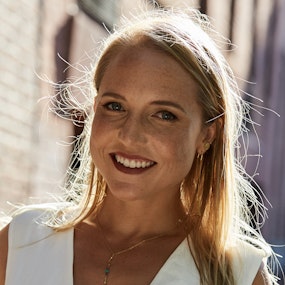
Kristin Wilson
Host of Badass Digital Nomads & YouTube's Traveling with Kristin / Author of Digital Nomads for Dummies
Kristin Wilson is a long-term digital nomad and location-independent entrepreneur who has lived and worked across 60 countries in 20 years. Since founding a fully-remote, international relocation company in 2011, she has helped more than 1,000 people retire or live abroad in 35 countries. Today, she helps aspiring remote workers, digital nomads, and expats achieve their lifestyle goals through her YouTube channel (Traveling with Kristin) and podcast, Badass Digital Nomads.
Kristin is the author of Digital Nomads for Dummies. She's also a Top Writer on Medium and Quora in the topics of business, travel, technology, life, productivity, digital nomads, and location independence. She has been featured on The Today Show, Bloomberg Businessweek, Business Insider, ESPN, The New York Times, WSJ, Huffpost, HGTV’s House Hunters International, and more.



























